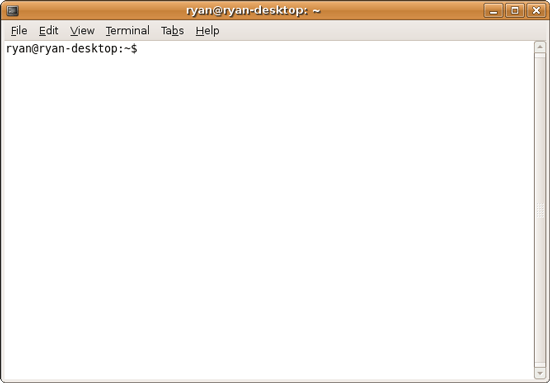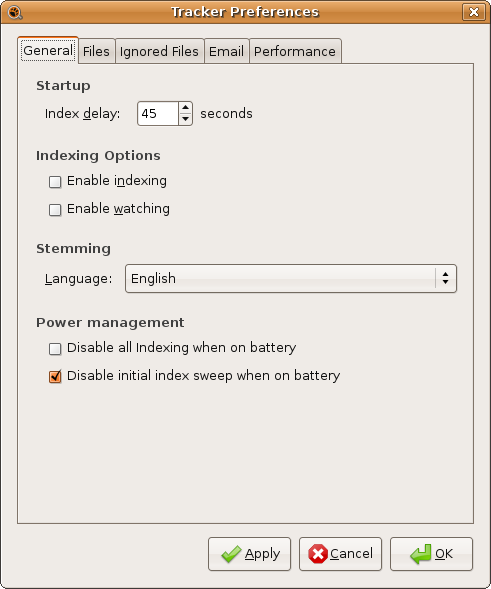Revisiting Linux Part 1: A Look at Ubuntu 8.04
by Ryan Smith on August 26, 2009 12:00 AM EST- Posted in
- Linux
The User Experience
Now that we’ve had a chance to go over the various features of Ubuntu and its included applications, we can get to the burning question: how is it?
In a nutshell, my own experience with Ubuntu has been that it’s capable of meeting 95% of my daily needs, and 75% of my weekly needs. Outside of the lack of the ability to sync my iPhone (which again is Apple’s fault), on any given day I did not need to boot up Windows. However in any given week I would need to boot in to Windows upwards of several times to run various Windows programs that don’t work under Wine or have a doppelganger for Ubuntu, not counting Windows games which also required booting back in to Windows. The result was that there was more dual booting than I would have liked, but it was acceptable.
What worked best for me under Ubuntu were the most common tasks, which makes sense given Ubuntu’s focus. We’ve already hit on how great Firefox is under Ubuntu, but also music playback, email, and word processing worked well. There was never any point where I felt like I could absolutely not accomplish something related to these tasks when using Ubuntu. However with that I will put the disclaimer that I didn’t find Ubuntu to be significantly better at any of these tasks – it was merely good enough.
If this sounds boring, it is. There’s not a lot to be said about otherwise mundane things that work well. Windows and Mac OS X could do these things, and so could Ubuntu. The distinguishing factor here really isn’t functionality; it’s that all of this was free.
In many situations Windows would still offer a better experience than Ubuntu. Sometimes this is a more polished GUI, as it is Ubuntu often looks like an orange version of Mac OS 9 (the bad Mac OS). Other times this would come down to professionally developed programs having an extra feature or two that while not critical, were nice to have. There are numerous little things like these that still keep Ubuntu well-separated from Windows and Mac OS X.

One item where I feel Ubuntu failed in particular is CLI use, which was a condition I outlined earlier. I wasn’t able to avoid using the CLI under Ubuntu, in fact I didn’t even come close. Some of this comes down to the fact that user generated support often uses CLI commands in lieu of instructions for dealing with the GUI, and in other situations such as mounting ISOs and installing video card drivers the situation was completely unavoidable. These are correctable problems.
Along those lines the default configuration of Ubuntu leaves me scratching my head. For example, Ubuntu has a file indexer and search system ala Windows Search and Spotlight. For whatever reason this indexer is not enabled by default and as a result it’s quite easy to miss. By the same token Compiz defaults to not using v-sync, which means windows will tear when moved. This is something hardware accelerated compositing specifically exists to solve. These items, along with finding a way (any way) to install the Microsoft Core Fonts by default so that the font disparity no longer exists would make the initial experience a better one.

The biggest negative influences in the Ubuntu experience were the items we listed under Things That Went Wrong. It’s easy to pick at things that don’t work, but these also happen to be the things that drove me out of Ubuntu for that moment. Meanwhile the biggest positive influences come down to Firefox and Totem. Neither is perfect, but as I discussed in their respective sections they’re great programs that are much better than the default programs found with Windows and Mac OS X.
Overall I found the Ubuntu experience to be decent, but not spectacular. Next to any issues listed out above, there’s a general lack of killer applications. As a result unless you specifically value the fact that it’s free (in either sense of the word) or the security benefits of it not being Windows, then there’s really nothing there that makes Ubuntu compelling compared to Windows or Mac OS X.










195 Comments
View All Comments
sheh - Thursday, August 27, 2009 - link
Also, it's "into", not "in to".Anyway, an interesting read. Thanks.
sheh - Thursday, August 27, 2009 - link
Also, it's "into", not "in to".Other than that, an interesting read. Thanks.
ssj4Gogeta - Thursday, August 27, 2009 - link
nevertheless is one "world"?:P
Ryan Smith - Wednesday, August 26, 2009 - link
Noted and fixed. Thank you.ClownPuncher - Wednesday, August 26, 2009 - link
Web browsing page - Ariel should read Arial when talking about fonts?pcfxer - Wednesday, August 26, 2009 - link
Ease of use of Ubuntu is superseded by PC-BSD and its PBI packages. PC-BSD also takes MUCH less time to install than Ubuntu.Souka - Wednesday, August 26, 2009 - link
I use PC-DOS 1.0aRuns very fast on my Core i7 setup, and I haven't even overclocked it yet.
ap90033 - Friday, August 28, 2009 - link
You probably can run more games in that than linux LOL...Penti - Tuesday, September 1, 2009 - link
You can run dosbox or dosemu in Linux just like in Windows...superfrie2 - Wednesday, August 26, 2009 - link
I'm not quite sure I agree with your criticism of .iso mounting in linux. The mount -o loop command is very easy to use after you've done a couple of times. In fact, I think it is far better than using D tools in windows because you don't have to worry about unclicking all the gay-ware it tries to get you to install.Also, I'm not sure I agree with your pseudo dislike for some forms CLI. CLI is far more powerful than what its GUI based copies tries to accomplish. As a matter of fact, the more I learn about linux's CLI, the less I use the GUI. I find myself only using the GUI for web browsing on a regular basis.
However, when looking at the linux GUI, compiz fusion is simply amazing. When I have a shitload of stuff open, compiz allows me to organize all of my windows and access them very efficiently. In fact, when I use windows for games, I feel handicapped.
The most interesting part your testing was that windows applications running under wine outperformed linux native applications. I look forward to hearing more about that aspect like you mentioned.